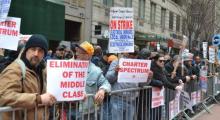NYC Co-op Told To Pull Free Service From Affordable Housing After City’s Reversal On Open Access Fiber
Last November we noted how New York City had scrapped its longstanding plan to build a promising open access fiber network. Not only did that stark reversal leave many partner ISPs high and dry after years of planning, some local community-run ISPs now say the city is forcing them to remove existing free service to affordable housing developments.
People’s Choice Communications, a small NYC cooperative cobbled together by striking Charter Communications workers, was one of several ISPs left in a lurch by the sudden reversal by the Adams administration.
Adding insult to injury, the ISP is now being told by the city to pull existing service provided for free to marginalized communities in The Bronx.
New York City’s original master plan was poised to be a game changer when it was first introduced back in 2020. The plan not only included a pilot program designed to bring affordable broadband to 450,000 residents of New York City Housing Authority (NYCHA) buildings, but a plan to spend $156 million on a pilot open access fiber network.
The proposal was to showcase the real-world benefits of the open access model, which data suggests results in significantly lower costs and higher quality service thanks to increased competition. If successful, the city would have then considered a bigger $2.1 billion plan to deploy such a network citywide, providing a template for major metropolitan areas nationwide.
New Mayor, Old Playbook
With the election of a new mayor, everything changed.




